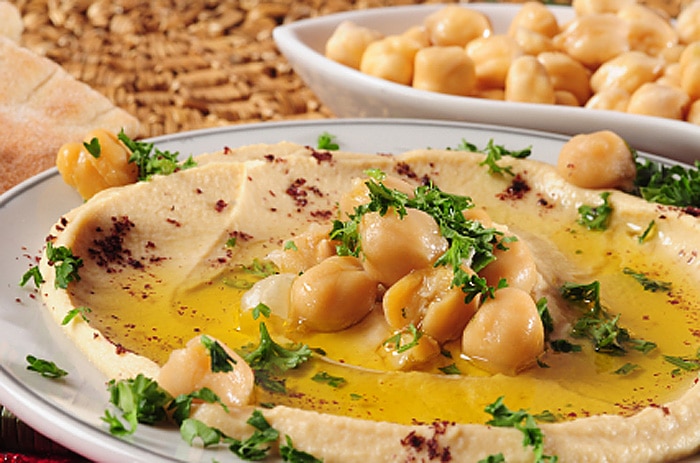If your budget doesn’t exactly stretch to include visiting an exotic locale, just do the next best thing – trade out your ho-hum everyday foods for something a little more adventurous. There’s no better place to start your culinary travels than the beautiful Middle East – and there’s no better time to start swapping than right now. September 2011 research in the American Journal of Clinical Nutrition reported that eating a Mediterranean diet along with maintaining a healthy weight, not smoking, and keeping active are key to extending your lifespan significantly. Since the concepts and foods in the Mediterranean diet are similar to those found on the Middle Eastern menu, take note and load your grocery cart with some of the foods below.

The Grocery World Tour: Middle Eastern Treats
- Bulgur (a whole grain): It doesn’t get easier than this! Since it’s sold parboiled and dried, it doesn’t take much longer than pasta to cook. But even better, there’s no pot to watch. Just pour 1 cup bulgur into a bowl and add 2 cups boiling water, then let the water and grain sit covered until fully absorbed. Use bulgur with chopped cucumber, parsley, and tomato to create a traditional tabbouleh; add to sautéed veggies; or, in cooler weather, toss a dry handful into soup, chili, or stew for added fiber and texture.
- Pita: If you’re tired of whole grain bread for your brown-bagged sandwiches, swap it out for whole wheat pita instead. To cure a snack attack without dipping into chips, cut pita into triangles, season (try oregano and garlic powder), and bake until crispy.
- Couscous: For a side to rival rice or pasta, go with whole wheat couscous for a change. Try it the traditional way, ladling a hearty stew over it, or simply cook in low-sodium chicken broth until fluffy and serve as a simple side.
- Nuts and seeds: A true Mediterranean diet obtains protein from plant-based sources, relying less on meat, making nuts an important part of this way of eating. And not only are nuts a great source of protein, but they can also help lower cholesterol in their own right. Pistachios, almonds, cashews, and pumpkin seeds are a few that you’ll traditionally find in Middle Eastern dishes, and are perfect to toss into trail mixes, sprinkle over oatmeal, or simply eat out of hand.
- Olive oil: Sure, olive oil adds fat – but the key is that it’s a heart-healthy monounsaturated fat, so feel free to do a drizzle. To really get the healthy benefits, use olive oil in place of saturated-fat-laden butter or trans-fat-filled margarine. Like the saying goes, when in Rome (er, the Middle East)… Remember, a true native wouldn’t sit at one of the finest Middle Eastern tables and slather pita with butter!
- Hummus: Beans are a simple way to sneak plant-based protein into your diet, and what’s easier than scooping into creamy hummus made from garbanzo beans? Best of all, this Middle Eastern healthy food is super easy to find in your local supermarket. Try it in place of mayo on a turkey sandwich, or wrap it up in a pita with some garden-fresh grilled veggies. Besides hummus, beans in whole form, whether canned or fresh, are a great way to boost protein and fiber in salads and soups. Fava and garbanzo beans (chick peas), traditionally found in Middle Eastern healthy foods, are great ways to dive in in to the cuisine.
- Fruits and Vegetables You can’t go wrong filling your diet up with the benefits of fruits and vegetables, but it’s fun to try a few new Middle-East-inspired produce picks. While many of the traditional dishes are composed of produce found in the typical American supermarket, like tomatoes, cucumbers, carrots and spinach, there are other finds that are less mainstream, but a great addition to your experience. For something new, try grilled eggplant over couscous or pomegranate arils tossed into orange sections. Curb a sweet tooth with a sliced date and a few raw almonds.
The Bottom Line
Get inspired to improve your diet and add a touch of adventure by adding in Middle Eastern healthy foods. Trying different foods from around the world is a great way to beat food boredom, allowing you to stay energized by eating a healthy diet.
Alumni: University of Tennessee, Knoxville – Beth Sumrell Ehrensberger is a Registered Dietitian and holds a Master Degree in Public Health. An experienced nutrition counselor, writer and public speaker, Beth specializes in translating complex nutrition information into practical concepts. Beth was awarded a Nutrition Communications Fellowship to the National Cancer Institute, and has worked on the internationally recognized Nutrition Action Healthletter of the Center for Science in the Public Interest.


